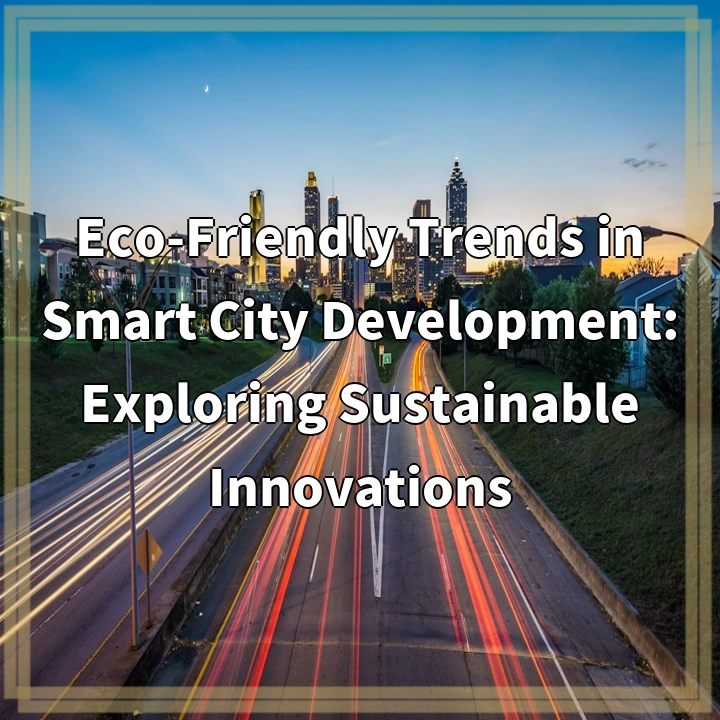
What is Eco-Friendly Trends in Smart City Development?
Smart city development refers to the integration of technology, data, and innovation to enhance the quality of life and sustainability of urban areas. Eco-friendly trends in smart city development focus on incorporating environmentally sustainable practices and technologies into the design and operations of cities. This approach aims to tackle various environmental challenges, such as pollution, resource depletion, and climate change, by promoting clean energy, efficient resource management, and sustainable transportation and infrastructure.
Real-World Problems Associated with Eco-Friendly Smart City Development
While eco-friendly trends in smart city development offer numerous benefits, they also face several challenges and real-world problems. By understanding and addressing these issues, we can work towards creating more effective and sustainable smart cities.
1. Cost and Financing
Implementing eco-friendly technologies and infrastructures in smart cities can be costly. The initial investment required for integrating renewable energy systems, developing sustainable transportation networks, and implementing smart grids can be a barrier for many cities. Finding appropriate funding models, attracting private investments, and ensuring affordability for residents are critical challenges.
2. Infrastructure Integration
Developing an eco-friendly smart city requires the integration and coordination of multiple infrastructure systems, including energy, water, waste management, transportation, and communication networks. Ensuring seamless integration of these systems while maintaining efficiency, reliability, and security is a significant challenge. Cities must overcome technical, logistical, and regulatory hurdles to achieve a well-connected and integrated smart city infrastructure.
3. Data Privacy and Security
Smart cities rely on vast amounts of data collected from various sensors and devices to optimize resource use, improve urban planning, and enhance the quality of life. However, this data collection raises concerns about privacy and security. Ensuring robust data protection measures, maintaining transparency, and addressing public concerns regarding data privacy are essential for the successful implementation of eco-friendly smart city initiatives.
4. Digital Divide
Unequal access to technology and digital infrastructure can exacerbate existing social and economic inequalities within a city. Not everyone has the same level of access to digital services, which can create a digital divide that undermines the inclusivity and fairness of eco-friendly smart city initiatives. Bridging this divide and ensuring equal access to technology and information is crucial for promoting sustainable development that benefits all residents.
Conclusion
Eco-friendly trends in smart city development hold tremendous potential to address environmental challenges while improving the quality of life for urban residents. However, it is crucial to address the real-world problems associated with cost, financing, infrastructure integration, data privacy, security, and the digital divide to ensure the successful and equitable implementation of sustainable smart city initiatives.

Solutions for Eco-Friendly Smart City Development
Addressing the challenges associated with eco-friendly smart city development requires innovative solutions and collaborative efforts. Here are some key strategies to overcome these real-world problems:
1. Financing and Cost Management
To overcome financial barriers, cities can explore public-private partnerships and secure funding from national and international organizations. Implementing cost-effective renewable energy solutions, promoting energy efficiency, and adopting circular economy principles can also help minimize long-term costs.
2. Integrated Planning and Collaboration
A holistic approach to smart city development is essential to ensure seamless integration of different infrastructure systems. Cities should engage in collaborative planning, involve multiple stakeholders, and establish clear communication channels to overcome logistical and regulatory challenges.
3. Data Privacy and Security Measures
To address concerns about data privacy and security, smart city initiatives should implement robust cybersecurity measures, adopt privacy-by-design principles, and promote transparency and public involvement in decision-making processes. Building trust and establishing data protection regulations can help alleviate privacy concerns.
4. Bridging the Digital Divide
City governments should prioritize digital infrastructure investments to bridge the digital divide. This includes expanding broadband access, providing digital literacy programs, and ensuring affordability and accessibility of digital services for all residents.
Conclusion
By implementing these solutions, cities can overcome the real-world problems associated with eco-friendly smart city development. With strategic financing, integrated planning, strong data privacy measures, and efforts to bridge the digital divide, smart cities can become more sustainable, inclusive, and resilient for the benefit of their residents and the environment.















